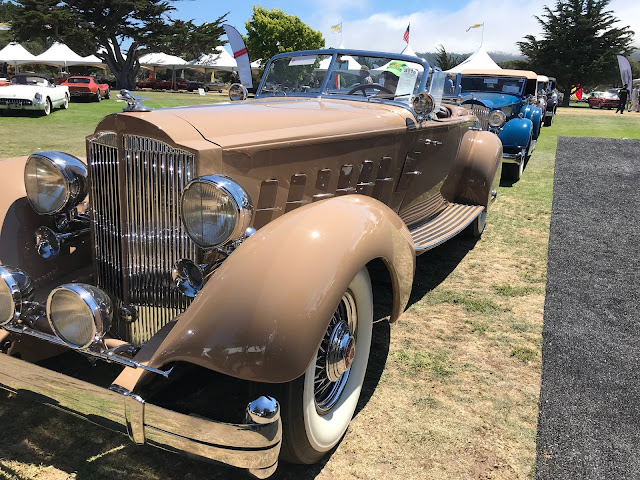 |
| The auction block at Mecum Monterey 2019. |
 |
| Cars from the Academy of Art Museum Collection line up to go onto the auction block. |
I spent Saturday, August 17, the final day of the auction, on the grounds and in the tent, paying special attention to the cars from the museum.
Of the 29 cars from the Academy of Art Museum Collection, only 15 sold, with the Museum choosing to hold out for more money on the other 14, including the stunning 1934 Packard 1108 V-12 Sport Phaeton with Fran Roxas coachwork you see above, which was only bid to $300,000, and the blue 1934 Packard 1108 Super Eight, which only made it to $145,000.
Mecum has a feature called "The Bid Goes On...", which allows interested parties to submit bids post-auction, so these cars may sell, sell soon, and sell through Mecum.
 |
| 1938 Talbot-Lago T120 Roadster with body by Brandone (photo courtesy Mecum Auctions). |
The Museum chose to walk away from the highest bid for any of its vehicles, $650,000, for a one-off Brandone-bodied 1938 Talbot-Lago T120 Roadster, which had been expected to sell for between $900,000 and $1,000,000.
 |
| 1933 Stutz DV-32 Dual Cowl Phaeton (photo courtesy Mecum Auctions). |
The highest bid that actually resulted in a sale for the Museum was $495,000 for this 1933 Stutz DV-32 Dual Cowl Phaeton. The price was strong enough to rank it number eight for the entire auction. But it and a 1935 Auburn 851 SC Boattail Speedster that was not part of the Museum collection were the only two pre-war cars in Mecum's top ten.
In fact, the next oldest car to make the Mecum top ten was a 1965 Shelby Cobra.
 |
| 1931 Ford Model A Victoria (photo courtesy Mecum Auctions). |
 |
| 1941 Cadillac Series 60 Special Fleetwood (photo courtesy Mecum Auctions). |
 |
| 1936 Ford Phaeton (photo courtesy Mecum Auctions). |
Sadly, a lot of cars went far too cheap (my opinion---the Museum only said "yes" when the bid was within range of the pre-auction estimate). And thankfully, the Academy of Art Museum held the line on cars that can and should bring more.
Part of this is an overall off year---all this summer's Monterey auctions saw prices down---but a lot of it was a declining interest in and thus declining values for cars from before World War II. Simply put, the guys for whom these cars had deep appeal have retired from the hobby, or in many cases, passed on.
This trend had begun during my brief stint as block announcer for Barrett-Jackson 15 years ago. Craig Jackson's dad built the business in the 1970s on pre-war cars---the stuff guys then in their 40s and 50s who now had some money had wanted since their younger days.
By the time I was there (2004 and 2005), the action had shifted to 60s and very early 70s muscle cars. And, with the exception of Monterey, where the money seems to gravitate toward Ferrari (five of this year's top ten), that appears to be holding true today.
Museums have generally been thought of as the safe haven for cars that age out of living collections---but museums have limited space and the need to attract patrons, which leaves the question---when the collectors are gone and the museums need to aggressively curate, where do the cars go next?